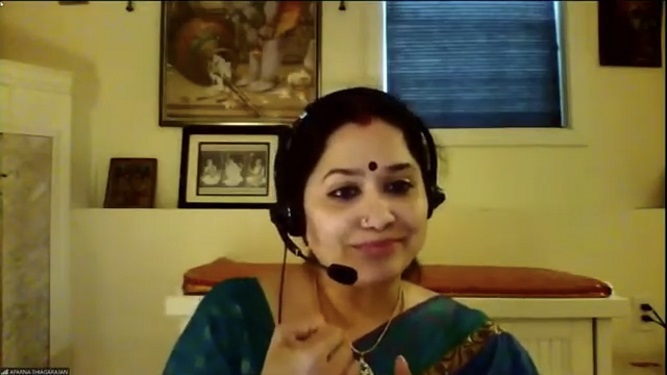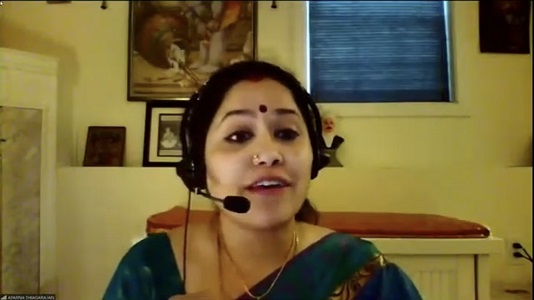Contribute
| A Purposeful Afternoon: "Karana" (purpose) |
Vinitha Varadarajan
07/09/2020
"Karana" (purpose) was the fourth lecture in a six-part demonstration series entitled "Sampradhayena Samudhbhavam" (revival through tradition) led by Vidushi Aparna Balaji, founder of Abhyaas School of Music for NE SRS Brundavan. Necessitated by Covid, this two hour program was disseminated through a live zoom webinar that was broadcast on Youtube. It was unusual and innovative in its format. Many young students were provided an opportunity to share their perspective on the purpose of Carnatic music. The lecture commenced in the realm of physical, progressed through emotional and finally culminated in the spiritual benefits of this fine art form. What emerged was refreshing and startling clarity in the minds of young students on the purpose of music, especially Carnatic music, as a means to leading a fulfilling life. Aparna inaugurated the session with the song “Sakala graha bala neene sarasijaksha†composed by Purandara Dasa in Atana. This song praising Vishnu could not have been better chosen. It metaphorically unfolded details of the session that would cover the wide range of benefits of music, similar to Vishnu’s all-encompassing powers. Physical and medical benefits of music were discussed with explanations on how certain ragas can be healing and therapeutic. Aparna proceeded to demonstrate the song “Durusuga kripa juci†composed by Shyama Sastry in Saveri. In this song, the composer seeks a strong and disease-free body. The relevance of the emotions of this song during the ongoing COVID pandemic cannot be understated. She also explained that researchers have found that singing stimulates the vagus nerve which can help treat epilepsy and depression. Several students shared their perspective on the physical benefits of Carnatic music. One student explained how she tries to balance her emotions by playing or singing happy songs when she is sad and, interestingly, songs with minor notes when she is “too happyâ€. This quest for balance, even in young children, who are exposed to music reveals volumes on the wisdom that this fine art form enables. Mental and intellectual benefits were discussed with striking examples of manodharma as a means to strengthening intellect. One of the students remarked “ Swara kalpana teaches me to sing succinctly and in a time bound manner. Raga alapana allows me to push the boundaries my creativity and Nereval combines both of these.†This showed how deeply music can be understood by young minds and how it opens the door to higher cognition. Emotional benefits of music were expounded by an introduction to “Arupagai†(six enemies) of man - kama (lust), krodha (anger), moha, (delusion), lobha (greed), matha (pride), matsarya (selfishness). Aparna explained that many composers have exhorted us to avoid these pitfall. They have pleaded with God, through their compositions to relieve them of these defects. A touching excerpt from one of the Pancharatna Kritis by Thyagaraja, Dudukugala, in Gowla raga was used to highlight this oft repeated emotion. “Maanavathanu durlabha manuchu nemchi paramaananda monda leka Bharatanatyam as a means to enhancing music rendition was elucidated with an example of how even the great composer Tyagaraja sought training in dance for this reason. Students well versed in Bharatnatyam shared their views on inseparability of dance and music. One of the students shared as follows: although there is a more transparent need for a dancer to understand the Sahitya of a song, the same holds true for complete rendition of a song by a vocalist. Romantic aspects of Varnam and using this emotion as a means of reaching god were discussed. Overall it was reiterated that all emotions cannot be expressed in words, but still need to find an outlet. Carnatic music, with its ragas, sahitya and rhythm help us express emotions that have no words and allow us to progress on a journey of spiritual discovery. Several students shared snippets of songs that they felt in some way represented the purpose of music. All songs were beautifully chosen and rendered. Together, they wove a beautiful cohesive garland. Some songs were soothing and calming such as Uyyala Lugavayya in Neelambari, Aadum Chidambaramo in Behag. There was a beautiful composition, Dikkigalettum Sidari by Bharataiyar which evoked awe for nature with stunning Sahitya and melody. After these demonstrations, the lecture gracefully moved to the spiritual realm with beautiful Bhakti filled compositions in Gauri Manohara in Gowri Manohari by Papanasam Sivan and Rama Rama in Vasantha, by Purandaradasa. There was an emotional song which fervently asked God to rescue us, very aptly chosen for these turbulent times: Needu Charanamule, in Simhendra Madhyamam by Thyagaraja. The last two songs of this free flowing lecture demonstration were Kanaka Sabhapati by Gopala Krishna Bharathi in Dhanyasi which stressed that even one glimpse of God can put us on the righteous path and Shobillu Saptaswara by Tyagaraja in Jaganmohini which symbolically summed up the totality of the benefits of music. The lecture was concluded by Aparna with a summary of everything we had covered, and key reminders to live a spiritually fulfilling and green life and using music as a method to do so. The limitations of the online form of demonstrations were almost fully overcome with a seamless and artistic presentation by students of Abhyaas led by Smt. Aparna Balaji. This paves the way for a new method of learning. Together, students have taken a small, but sure step towards discovering our abundant traditions, ourselves and even God through the finest of fine art forms. Note: Abhyaas has been enriching greater Boston and New England communities with Indian Carnatic music lessons and workshops since 2001. You can find a link to their website here: https://sites.google.com/site/abhyaasaparna/ This series is sponsored by NE-SRS Brundavan, affiliated to the Shri Raghavendra Swamy Mutt in Mantralaya. You can register for the remaining two lectures at the following website: https://www.ne-srsbrundavan.org/
mada mathsara kaama lobha mohula kuDaasudai- mosa bothi gaaka
mothati kulajudakuchu bhuvini kshudrula panulusalpuchunundini gaaka
naraadha mulanu kori saara heena madamulanu saadhimpa thaa ru maaruâ€
You may also access this article through our web-site http://www.lokvani.com/

